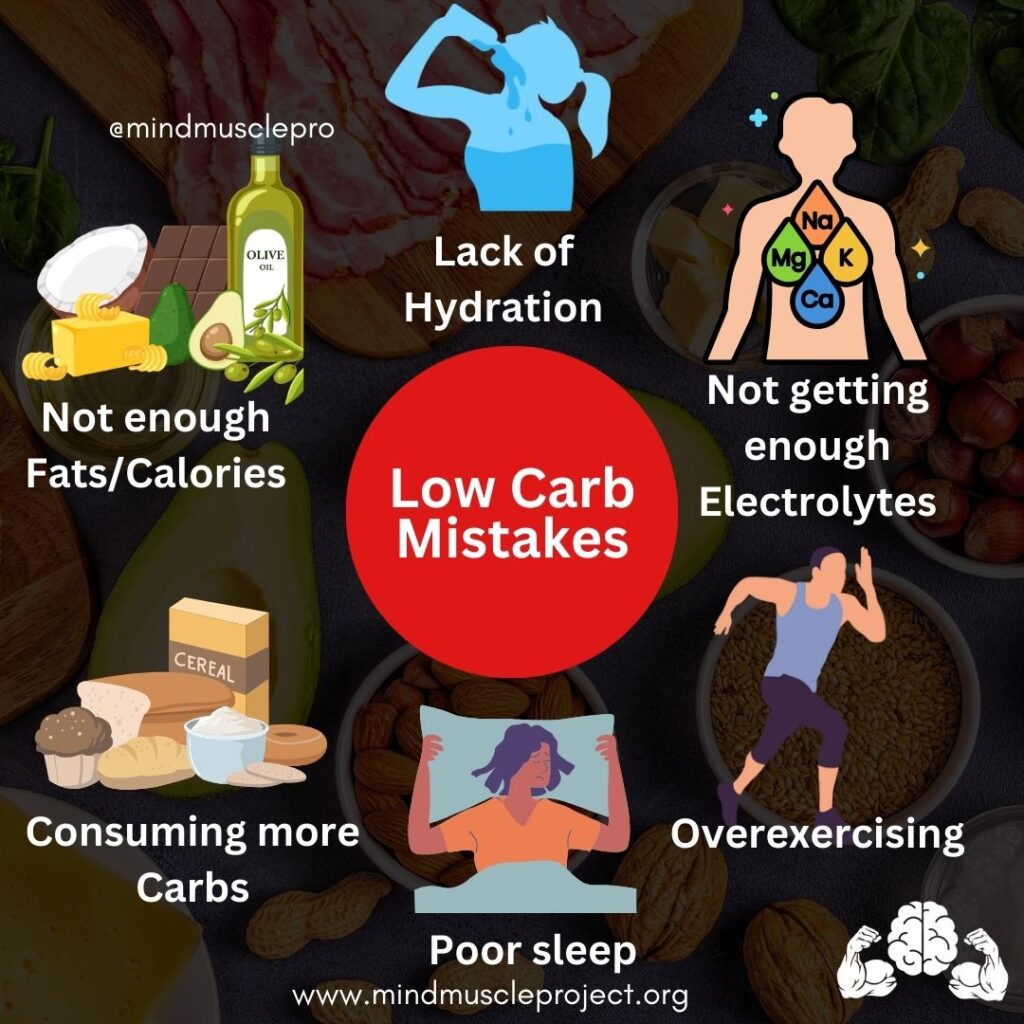Transitioning to a low-carb or keto lifestyle can be transformative, but certain mistakes can hinder progress and even backfire. Here’s a guide to help you steer clear of common pitfalls:
1. Not Consuming Enough Fats or Calories #
Low-carb diets, especially Keto, are built on the foundation of “Low Carb, High Fat” (LCHF).
- Why It’s a Problem: Focusing too much on cutting carbs while neglecting adequate fat intake can leave you feeling deprived and low on energy.
- What to Do: Embrace healthy fats to maintain satiety and energy levels.
Healthy Fats to Include: #
- Ghee
- Coconut Oil
- Butter
- Animal Fats (like tallow)
- Extra Virgin Olive Oil
2. Inadequate Hydration #
Hydration is a key component of any diet, but especially on low-carb diets.
- Why It’s a Problem: Insufficient water intake can lead to issues like constipation and sluggishness.
- What to Do: Prioritize water intake, especially first thing in the morning, and minimize caffeinated beverages like coffee or diet soda.
3. Not Getting Enough Electrolytes #
Hydration goes beyond water—it’s about balancing electrolytes.
- Why It’s a Problem: Low insulin levels on a low-carb diet increase electrolyte loss, which can lead to fatigue, cramps, or headaches.
- What to Do: Replenish key electrolytes like sodium, potassium, and magnesium through diet or supplements.
Sources of Electrolytes: #
- Salt
- Bone Broth
- Seafood
- Bacon
- Magnesium and potassium supplements
4. Consuming Too Many Carbs #
This may sound obvious, but it’s easy to consume hidden carbs unknowingly.
- Why It’s a Problem: Eating too many carbs keeps you from entering or maintaining ketosis, making your low-carb efforts ineffective.
- What to Do: Educate yourself on the carb content of different foods and track your intake carefully.
5. Stress and Poor Sleep #
Your lifestyle habits play a huge role in your success on any diet.
- Why It’s a Problem: Stress and poor sleep elevate cortisol levels, which can disrupt blood sugar balance and hinder fat loss.
- What to Do: Prioritize relaxation techniques, improve your sleep hygiene, and manage stress effectively.
6. Consuming Low-Quality Fats or Processed Foods #
The type of fat matters just as much as the quantity.
- Why It’s a Problem: Relying on processed or unhealthy fats, like trans fats, can negatively impact your health even if you’re eating low-carb.
- What to Do: Choose nutrient-dense, whole-food sources of fat and avoid overly processed options.
7. Over-Exercising #
While exercise is beneficial, overdoing it—especially when your body hasn’t fully adapted to fat as a fuel source—can be counterproductive.
- Why It’s a Problem: Excessive exercise can increase stress on your body, leading to hormonal imbalances and blood sugar fluctuations.
- What to Do: Ensure you’re consuming enough calories to fuel your workouts and allow ample recovery time.
Key Takeaways: #
- Low-carb diets are about balance: low carbs, adequate fat, proper hydration, and nutrient-dense foods.
- Address lifestyle factors like stress, sleep, and exercise for maximum benefits.
- Keep learning and adjusting as you progress on your low-carb journey.
By avoiding these common mistakes, you can set yourself up for long-term success and improved health.





